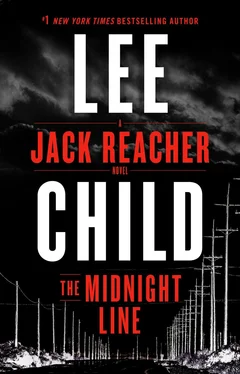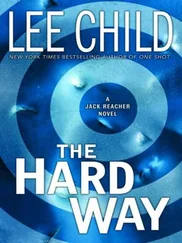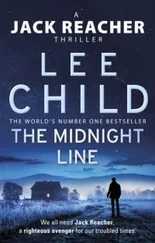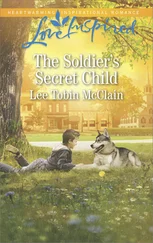There was a main house, all log, old, modest in size, nearly matched in its dimensions by a separate log cottage, newer, some distance away. In between were log barns and wood stores and storage structures, some of them big enough for a decent truck, some of them as small as garden sheds or dog houses.
First thing they did was knock on the door. No one was home. Not a surprise. Reacher figured no one had been home for a couple of years. Maybe more. Every step on the porch raised a puff of dust, from the red sand, blown as fine as talcum.
Second thing they did was check the surrounding terrain. It was crusted smooth by wind and snowmelt. Undisturbed. Certainly there were no new tire tracks. The Toyota’s own stood out crisp and fresh and vivid. A total contrast. Mackenzie felt that was game over right there. She felt it was impossible to live in Wyoming without a vehicle. Therefore no sign of a vehicle meant no sign of life. Rose wasn’t there. Not camped out in any of the various buildings. Reacher agreed. Bramall agreed.
They moved on.
They drove the six miles back down the track, and turned on the dirt road, and headed west again. One down, five to go. The next driveway would most likely be on the right.
“Look,” Bramall said.
He pointed.
Up ahead, still far away, another worm of dust. At its head, another vehicle coming toward them. It was rare to see another car? Not really. It was getting like Times Square.
They drove on, closing the gap.
It was a big vehicle coming.
“That could be her friends,” Mackenzie said. “Same size of truck.”
“Block the road,” Reacher said. “Make them stop.”
Bramall took his foot off the gas, and steered left, and straddled the crown of the road. He put his hazard flashers on, and blinked his high beams, and coasted on slowly to a hundred-yard stretch that had a knee-high rock ledge on one side, and a drainage ditch on the other. He came to a stop halfway between them. No way around. The engine idled. The hazard flashers clicked urgently. He pulsed the headlights, fast, slow, randomly, like Morse code.
Up ahead the big truck slowed. Behind it the dust cloud caught up momentarily, and then thinned out and fell away. The truck stopped three hundred yards west, in the middle of the road itself, like a long-distance showdown.
“More than one person,” Reacher said. “They can’t agree what to do. They stopped to talk it out.”
They waited.
Up ahead the truck moved forward. Slowly. Like cruising a parking lot. It rolled on. Two hundred yards away. One hundred. Fifty yards away.
It was the same crew-cab they had seen the night before. Huge size, a rumbling exhaust. Three people in it. The same guys. Reacher was sure of it. They came to a stop fifty feet away. Bramall turned off his hazard lights. For a second the tableau was frozen, two trucks facing off, close together, engines idling, on a narrow red ribbon in the middle of a vast version of nowhere.
Mackenzie got out of the Toyota.
Bramall moved to do the same, but Reacher put a hand on his shoulder.
“We need to talk,” he said.
“About what?”
“Your client. She’s got a tough day ahead.”
“You know what’s going to happen?”
“Unfortunately,” Reacher said. “It’s the only thing that fits.”
But Mackenzie was already turned around, miming impatience, so Bramall slid out to join her, followed by Reacher, three steps behind. From the crew-cab came the guy with the lizard boots, and his two companions. Six people altogether, in two groups of three, all of them eyeing the no-man’s-land between their radiator grilles, their postures subject to ancient instincts. They met in the middle, five polite feet apart, safely longer than a dagger’s thrust, another ancient instinct.
The guy in the boots said, “The message hasn’t changed.”
“I thought about that,” Reacher said. “Seemed to me, if you boiled it right down, the main takeaway from the message was we should go back where we came from. Which makes it more of a suggestion, don’t you think? Call it a request, to assume good manners on your part. And hey, plenty of requests are perfectly reasonable. We all know that. I would like to request a million dollars and a dinner date with Miss Wyoming. But the point of a request is that it can be declined. Respectfully, with great regret, and so on. But declined nonetheless. Which is what is happening here.”
“Unacceptable.”
“Get used to it. We’re going to stick around, and if any of the actual landowners out here have a problem with it, I’m sure the state has laws that would allow them to seek a remedy.”
The guy said, “Right now we’re being nice about it.”
“My advice, you should keep on being nice about it. Even if we lose, we’ll do some damage. Two of you will go to the hospital. Best case. But from what I’ve seen, I have to say, the best case looks unlikely. I don’t think we’ll lose. I think all three of you will go to the hospital.”
The guy paused a beat.
Then he said, “OK, it was a request.”
Reacher said, “I’m glad we got that cleared up.”
“There’s nothing for you here.”
“Who made the request?”
“I’m not going to tell you. This whole thing is about privacy. You don’t get it, do you?”
Reacher said, “You got a phone?”
“Who do you want to call?”
“Take a picture. Video would be better. You got video on your phone?”
The guy said, “I guess.”
“All we’ll do is say our names. Maybe add a line of background. On your phone. Then you can take it back and show it to whoever it was who made the request. That would be fair to all concerned.”
“You might follow us there.”
“We promise we won’t.”
“Why would we trust you?”
“You live in there somewhere. We know that. By now it’s a one-in-five chance. We’ll find you sooner or later. It’s only a matter of time.”
The guy didn’t answer.
“But I’d rather do it this way,” Reacher said. “This way is better.”
The guy didn’t answer. But eventually he nodded. One of the back-row guys stepped up with a phone. He held it horizontal between splayed fingers, and crossed his eyes, and said, “Go.”
Mackenzie said, “Jane Mackenzie.”
Bramall said, “Terry Bramall, private detective from Chicago.”
Reacher said, “Jack Reacher, ex-army, once upon a time CO of the 110th MP.”
The back-row guy lowered the phone.
Reacher said, “We’ll wait here.”
“Could be a couple hours,” the guy with the boots said. “You got water?”
The other back-row guy carried bottles of water from their truck to the Toyota. Then they backed up and turned around and drove away. The dust cloud picked up behind them, turning, rising, falling, hanging in the air like evidence, showing the way they had gone, like a whoosh in a cartoon strip.
Bramall said, “Do we follow?”
“No,” Reacher said. “A professional courtesy. Not required, but expected.”
Mackenzie said, “You know, don’t you?”
“I know two things,” Reacher said. “She lives here, and no one recognizes you.”
Chapter 32
Bramall backed up to where the rock ledge petered out and the ditch filled in. He parked on the shoulder, a little tilted, facing west. Reacher drank a bottle of donated water, and walked back to the ledge, and sat in the sun. The last of summer. No one talked. Mostly Bramall sat in the car, nothing on his face, a man life had taught to be patient. Mostly Mackenzie stood alone, as far from the car as Reacher, but in the other direction. High overhead ravens circled, and looked, and thought not yet, and soared away.
—
In the end it was less than two hours. It was ninety-three minutes, which was an hour and a half and change. Far in the distance a smudge of dust kicked up, with a black dot in front of it, which grew larger, until they could see who it was. It was the three guys in their crew-cab. Back again. Like before, they stopped fifty feet out, and they climbed down, and they walked forward.
Читать дальше












